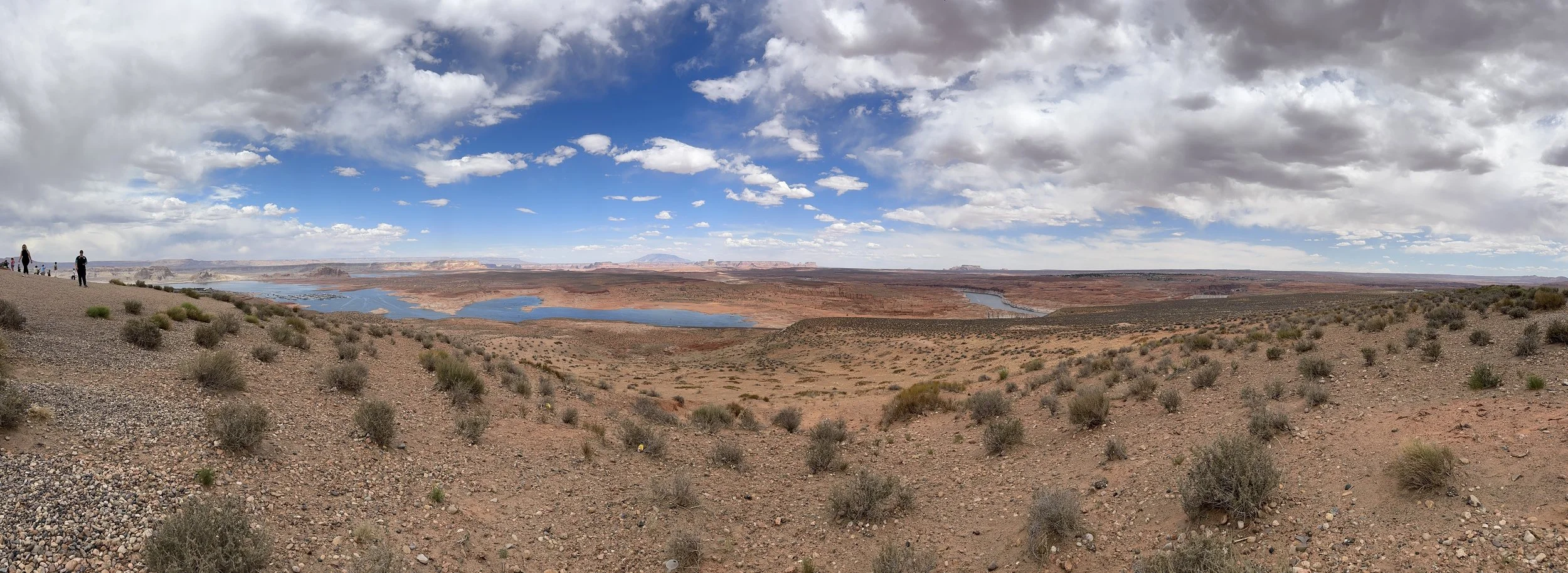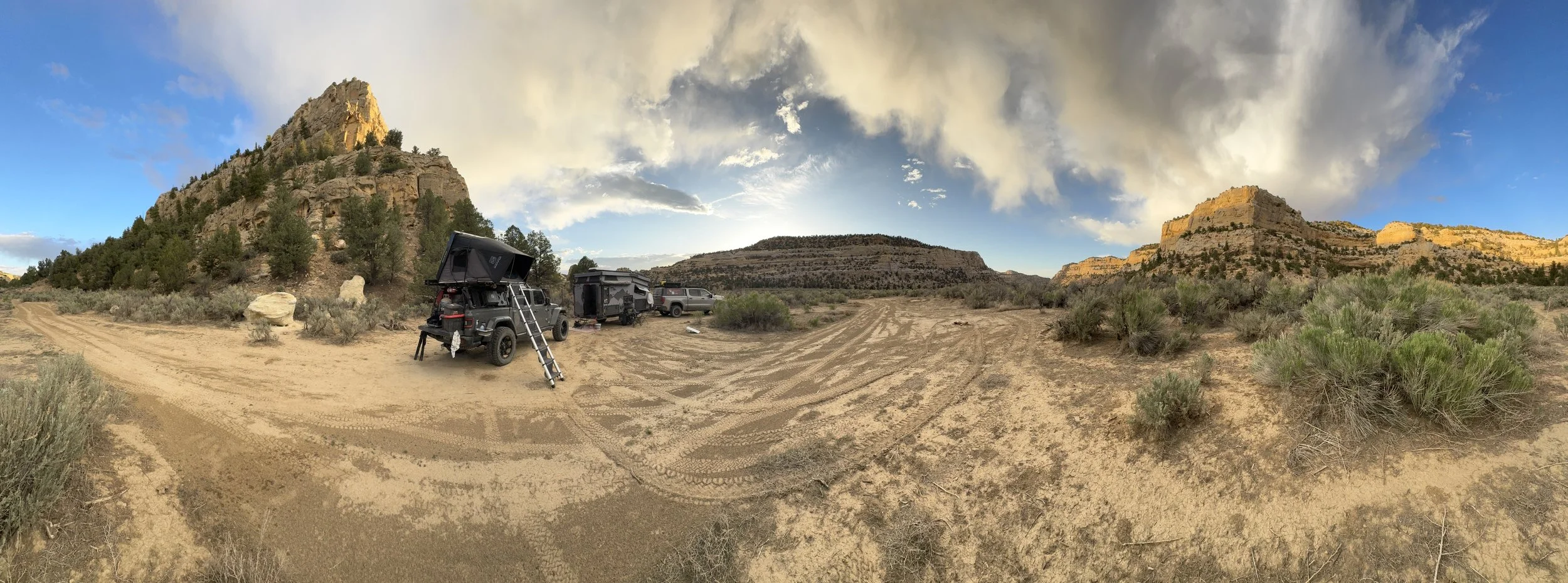Cultivating Inner Peace Through Overlanding
Photo taken from our dispersed campsite at Valley of the Gods, Utah.
Cultivating Inner Peace Through Overlanding
By David Wade
In a world that often feels like it’s spinning faster than we can keep up, the search for inner peace has become a universal pursuit. The constant hum of notifications, the pressure of deadlines, and the weight of societal expectations can leave us yearning for a way to reconnect with ourselves and discover what truly matters. For many, the answer lies not in meditation apps or wellness retreats but in the raw, unfiltered experience of overlanding—a form of off-road travel that blends adventure, self-reliance, and immersion in nature. From the rugged deserts of the Southwest to the dense forests of the Pacific Northwest, overlanding offers a unique path to cultivating inner peace and uncovering what it means to live your best life.
The view from our dispersed campsite on the NE side of the Grand Canyon, Arizona.
The Essence of Overlanding
Overlanding is more than just a mode of travel; it’s a philosophy. At its core, it’s about journeying into remote areas with a vehicle—often a modified truck, SUV, or van—equipped to sustain you for days or weeks. Unlike traditional camping, overlanding emphasizes self-sufficiency, exploration, and the ability to adapt to whatever the terrain throws your way. It’s not about reaching a specific destination but about embracing the journey itself, with all its challenges and revelations.
The appeal of overlanding lies in its simplicity and authenticity. You pack what you need, plot a route through public lands or backcountry trails, and set out into the wild. There’s no itinerary dictated by hotel bookings or tourist traps—just you, your rig, and the open landscape. This stripped-down approach creates space for reflection, forcing you to confront what’s essential in your life and what’s merely noise.
Disconnecting to Reconnect
One of the most profound ways overlanding fosters inner peace is by encouraging disconnection from the digital world. In the remote corners of our country, cell service is often nonexistent. At first, the absence of Wi-Fi and notifications can feel jarring. But as the days unfold, that silence becomes liberating.
Without the constant pull of screens, you’re free to be fully present. You notice the way the light shifts across a canyon wall at dusk or the sound of wind rustling through pine trees. These moments of mindfulness aren’t forced; they emerge naturally when you’re unplugged. Studies have shown that spending time in nature reduces cortisol levels and boosts serotonin, contributing to a sense of calm and well-being. Overlanding amplifies this effect by immersing you in nature for extended periods, allowing you to reset your mental and emotional state.
This disconnection also prompts introspection. Away from the distractions of daily life, you’re left with your thoughts, your values, and your aspirations. Questions like “What do I really want?” or “What makes me feel fulfilled?” begin to surface. For many overlanders, these quiet moments of reflection are where the seeds of a better life are planted. You start to see that your best life isn’t about chasing external validation but about aligning your actions with your deepest priorities.
The Power of Self-Reliance
Overlanding demands a level of self-reliance that’s rare in modern life. When you’re miles from the nearest town, there’s often no one to call if your vehicle gets stuck or your fuel supply runs low. You learn to trust your skills, whether it’s navigating with a topographic map, fixing a flat tire, or building a fire in the rain. This self-sufficiency is empowering, fostering a sense of competence and confidence that carries over into other areas of life.
But self-reliance in overlanding isn’t just about practical skills; it’s also about emotional resilience. The unpredictability of the journey—sudden weather changes, washed-out trails, or mechanical issues—forces you to adapt and let go of the need for control. This surrender to the unknown can be profoundly liberating. It teaches you to embrace uncertainty, a skill that’s invaluable in navigating life’s broader challenges.
As you overcome obstacles on the trail, you begin to redefine what success looks like. It’s not about a corner office or a packed social calendar but about trusting yourself to handle whatever comes your way. This shift in perspective is a cornerstone of inner peace, as it frees you from the pressure to meet external standards and allows you to focus on your own growth.
Image taken while hiking near Lake Powell, Utah.
Building Connection Through Solitude and Community
While overlanding often involves solitude, it’s not about isolation. The balance of alone time and connection with others is another way it nurtures inner peace. When you’re traveling solo or with a small group, the vastness of the landscape can feel like a mirror for your inner world. In places like Utah’s Moab desert or the rolling prairies of Montana, the sheer scale of the environment puts your worries into perspective. Problems that once seemed insurmountable shrink in the face of towering rock formations or endless skies.
Yet overlanding also fosters community in unexpected ways. Across North America, overlanders form tight-knit networks, sharing tips on routes, gear, and campsites. Gatherings like Overland Expo West in Arizona or dispersed meetups in places like Oregon’s Wallowa Mountains bring together people from diverse backgrounds, united by a love of adventure and exploration. These connections are often deeper than casual friendships because they’re rooted in shared values: a respect for nature, a desire for freedom, and a willingness to embrace the unknown.
For many, these interactions help clarify what their best life looks like. Conversations around a campfire—about everything from vehicle mods to life goals—spark new ideas and perspectives. You might meet someone who’s left a corporate job to live nomadically or another who’s found balance by overlanding on weekends. These stories inspire you to think creatively about your own path, reinforcing that there’s no one-size-fits-all definition of fulfillment.
The Role of Nature in Healing
The landscapes of North America are a cornerstone of the overlanding experience, and their impact on mental and emotional well-being can’t be overstated. From the misty rainforests of Washington’s Olympic Peninsula to the sun-scorched expanses of Nevada’s Black Rock Desert, these environments offer more than just stunning views—they’re a balm for the soul.
Research supports what overlanders know intuitively: exposure to natural environments reduces stress, improves mood, and enhances cognitive function. The Japanese practice of shinrin-yoku, or forest bathing, has shown that simply being among trees can lower blood pressure and boost immune function. Overlanding takes this a step further by immersing you in diverse ecosystems for days or weeks at a time. Whether you’re waking up to the sound of waves on Lake Superior’s shores or stargazing in New Mexico’s Gila National Forest, these experiences ground you in the present moment.
This connection to nature also fosters a sense of stewardship. As you travel through public lands, you become acutely aware of their fragility and the need to protect them. Many overlanders adopt Leave No Trace principles, packing out trash and minimizing their impact. This act of care deepens your relationship with the land and, by extension, with yourself. It’s a reminder that living your best life includes contributing to something larger than yourself.
Redefining Your Best Life
At its heart, overlanding is a journey of self-discovery. It strips away the superficial markers of success—status, wealth, or social media likes—and invites you to define what matters most to you. For some, that might mean pursuing a simpler, more nomadic lifestyle. For others, it could be integrating the lessons of overlanding—resilience, mindfulness, and connection—into their daily routines.
The beauty of overlanding is that it’s accessible to anyone willing to embrace it. You don’t need a high-end rig or years of experience. A used SUV, a tent, and a map can be enough to start exploring the backroads of places like Idaho’s Sawtooth National Forest or Arizona’s Coconino National Forest. The key is to approach it with an open mind and a willingness to learn.
As you navigate the challenges and joys of overlanding, you’ll likely find that inner peace isn’t a destination but a process. It’s cultivated through the small, intentional choices you make: to disconnect from distractions, to trust your instincts, to immerse yourself in nature, and to connect with others who share your values. These choices ripple outward, shaping not just your time on the trail but the way you live your life off it.
Practical Steps to Begin
If you’re inspired to try overlanding, start small. Research public lands near you—North America is rich with Bureau of Land Management (BLM) areas and national forests that offer free or low-cost camping. Invest in basic gear like a reliable vehicle, a good tent, and a portable stove. Apps like Gaia GPS or onX Offroad can help you plan routes and find campsites. Join online forums or local overlanding groups to learn from experienced travelers.
Most importantly, approach overlanding with curiosity and patience. Your first trip might be riddled with mistakes—a wrong turn, a forgotten piece of gear—but those are part of the journey. Each challenge is an opportunity to grow, to refine your skills, and to get closer to the life you want to lead.
Photo taken while dispersed camping in Grand Staircase Escalante, Utah.
Conclusion
Overlanding is more than an adventure; it’s a pathway to inner peace and self-discovery. By disconnecting from the noise of modern life, embracing self-reliance, and immersing yourself in the beauty of North America’s landscapes, you create space to reflect on what truly matters. The lessons learned on the trail—resilience, mindfulness, and connection—become tools for crafting a life that feels authentic and fulfilling. In a world that often pulls us in a thousand directions, overlanding offers a chance to slow down, look inward, and discover what your best life really means.



